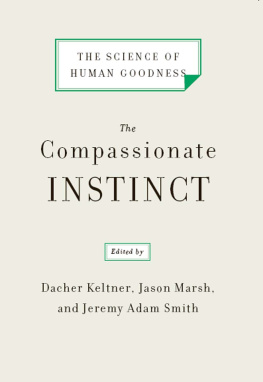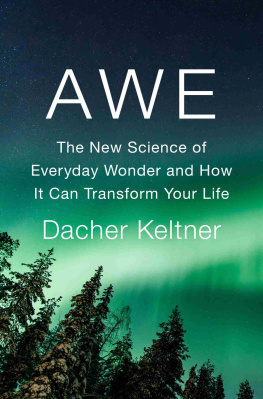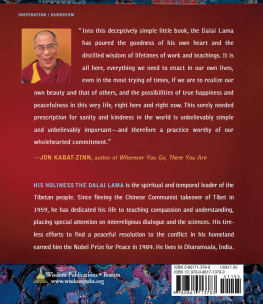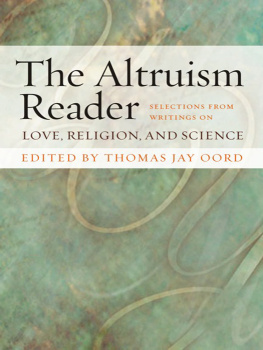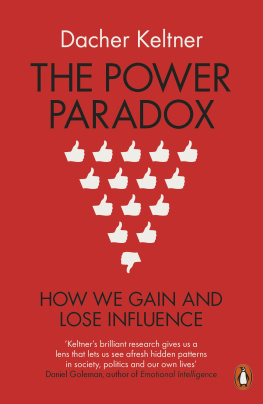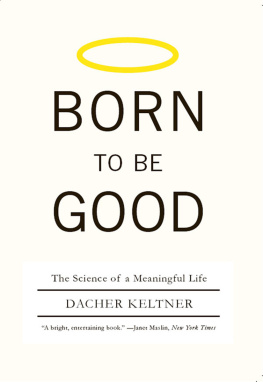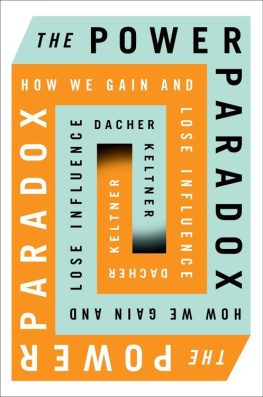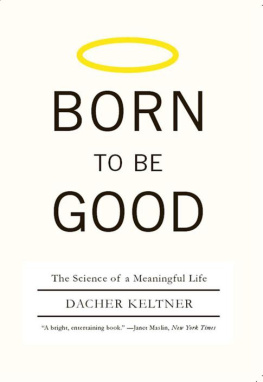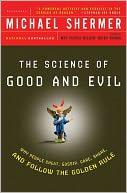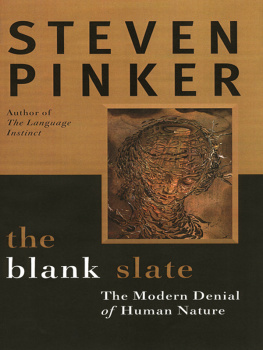THE COMPASSIONATE INSTINCT
The Science of Human Goodness
Edited by Dacher Keltner, Jason Marsh, and Jeremy Adam Smith
W. W. NORTON & COMPANY New York London
Copyright 2010 by The Greater Good Science Center
All rights reserved
Library of Congress Cataloging-in-Publication Data
The compassionate instinct: the science of human goodness / edited by Dacher Keltner, Jason Marsh, and Jeremy Adam Smith.1st ed.
p. cm.
ISBN: 978-0-393-07685-1 (e-book)
1. Helping behavior. 2. Compassion. 3. Interpersonal relations. 4. Altruism.
I. Keltner, Dacher. II. Marsh, Jason. III. Smith, Jeremy
Adam, 1970
BF637.H4C65 2010
155.232dc22
2009022521
W. W. Norton & Company, Inc.
500 Fifth Avenue, New York, N.Y. 10110
www.wwnorton.com
W. W. Norton & Company Ltd.
Castle House, 75/76 Wells Street, London W1T 3QT
TO ALL THOSE WHO HAVE SUPPORTED
GREATER GOOD MAGAZINE
READERS, CONTRIBUTORS, AND DONORS
ACKNOWLEDGMENTS
T HIS BOOK CONTAINS some of the best essays from Greater Good magazine (www.greatergoodmag.org), which for five years has flourished due to the hard work of hundreds of people, from staff and volunteers to writers and editorial board members.
Special thanks to Jill Suttie, our volunteer book review editor, and Alfonso Jaramillo, our design editor. We extend our most profound gratitude to everyone who has contributed to Greater Good and to our dedicated readers and donorseven if space limitations prevent us from thanking each by name.
We would like to express special gratitude to Thomas and Ruth Ann Hornaday and the Herb Alpert Foundation, whose combined support made Greater Good possible. Thanks also to Maria Guarnaschelli, the editor at W. W. Norton who championed and helped shape The Compassionate Instinct .
The three editors would also like to thank our wivesMollie McNeil, Meredith Milet, and Olli Doofor their patience and support.
CONTENTS
The Compassionate Instinct
Dacher Keltner
The Evolution of Empathy
Frans B. M. de Waal
Peace among Primates
Robert M. Sapolsky
Hope on the Battlefield
Dave Grossman
Political Primates
Christopher Boehm
The Forgiveness Instinct
Michael E. McCullough
The New Science of Forgiveness
Everett L. Worthington Jr.
Brain Trust
Michael Kosfeld
Pay It Forward
Robert A. Emmons
Wired to Be Inspired
Jonathan Haidt
Feeling Like Partners
Philip A. Cowan, Carolyn Pape Cowan, and Neera Mehta
Love, Honor, and Thank
Jess Alberts and Angela Trethewey
Stumbling toward Gratitude
Catherine Price
The Choice to Forgive
Fred Luskin
Compassion across Cubicles
Jill Suttie
Are You a Jerk at Work?
Robert I. Sutton
A Feeling for Fiction
Keith Oatley
A Different View
Alfie Kohn
Can I Trust You? A Conversation between Paul Ekman and His Daughter Eve
Jason Marsh
Hot to Help
Daniel Goleman
We Are All Bystanders
Dacher Keltner and Jason Marsh
The Cost of Apathy: An Interview with Robert Reich
Jason Marsh
The Activism Cure
Meredith Maran
Americas Trust Fall
Jeremy Adam Smith and Pamela Paxton
The Power Paradox
Dacher Keltner
Edible Ethics: An Interview with Michael Pollan
Jason Marsh
The Hot Spot
Lisa Bennett
In Search of the Moral Voice
Jason Marsh
Making Peace through Apology
Aaron Lazare
Truth + Reconciliation
Desmond Tutu
Why Is There Peace?
Steven Pinker
The Morality of Global Giving: An Interview with Jan Egeland
Jason Marsh
Global Compassion: A Conversation between the Dalai Lama and Paul Ekman
Paul Ekman
The Heroine with One Thousand Faces
Lisa Bennett
The Banality of Heroism
Zeno Franco and Philip Zimbardo
CONTRIBUTORS
JESS ALBERTS, PH.D ., is Presidents Professor in the Hugh Downs School of Human Communication at Arizona State University. Her research interests include conflict, relationship communication, and the division of labor.
LISA BENNETT is the communications director for the Center for Ecoliteracy, a nonprofit dedicated to education for sustainable living, and a former fellow at Harvard Universitys Joan Shorenstein Center on the Press, Politics, and Public Policy. She is writing a book about parenting in the age of global warming.
CHRISTOPHER BOEHM, PH.D ., is a professor of anthropology and biological sciences at the University of Southern California and the author of Hierarchy in the Forest: The Evolution of Egalitarian Behavior (Harvard University Press).
CAROLYN PAPE COWAN, PH.D ., is a professor of psychology emerita at the University of California, Berkeley, and the codirector, with her husband, Philip A. Cowan, of several long-term projects working with families: the Becoming a Family, Schoolchildren and Their Families, and Supporting Father Involvement projects. She has published many articles and books on family relationships and transitions.
PHILIP A. COWAN, PH.D ., is a professor of psychology emeritus at the University of California, Berkeley, and the codirector, with his wife, Carolyn Pape Cowan, of several long-term projects working with families. He and his wife also conducted a famed two-decade study of two hundred nuclear families that informed their book When Partners Become Parents: The Big Life Change for Couples (Lawrence Erlbaum). He has served as the director of both the clinical psychology program and the Institute of Human Development at UC Berkeley.
PAUL EKMAN, PH.D ., is the worlds foremost expert on facial expressions and a professor emeritus of psychology at the University of California Medical School in San Francisco. He is the author of fifteen books, including, most recently, Emotional Awareness (Times Books), a conversation between himself and the Dalai Lama. He is also a member of Greater Good s editorial board.
ROBERT A. EMMONS, PH.D ., has taught in the department of psychology at the University of California, Davis, since 1988. He is the founding editor and editor-in-chief of the Journal of Positive Psychology and is the author of THANKS! How the New Science of Gratitude Can Make You Happier (Houghton-Mifflin).
ZENO FRANCO is a Ph.D. candidate in clinical psychology at Pacific Graduate School of Psychology in Palo Alto, California. He recently completed a three-year U.S. Department of Homeland Security fellowship.
DANIEL GOLEMAN, PH.D ., is an internationally renowned author, psychologist, and science journalist, who for twelve years wrote for the New York Times , specializing in psychology and brain sciences. He is the author of numerous books, including the best sellers Emotional Intelligence and Social Intelligence (Bantam), and writes the Social Intelligence column for Greater Good magazine. Goleman has received many awards for his writing, including a Career Achievement award for journalism from the American Psychological Association.
LT. COL. DAVE GROSSMAN , a former Army Ranger and paratrooper, taught psychology at West Point and was formerly a professor and chair of the department of military science at Arkansas State University. He is the author of On Killing: The Psychological Cost of Learning to Kill in War and Society (Back Bay Books), which was nominated for the Pulitzer Prize for nonfiction.
JONATHAN D. HAIDT, PH.D ., is a professor of psychology at the University of Virginia and the author of The Happiness Hypothesis: Finding Modern Truth in Ancient Wisdom (Basic Books). His essay draws from his chapter in Flourishing: Positive Psychology and the Life Well-Lived (American Psychological Association), a book he coedited with Corey L. M. Keyes.

